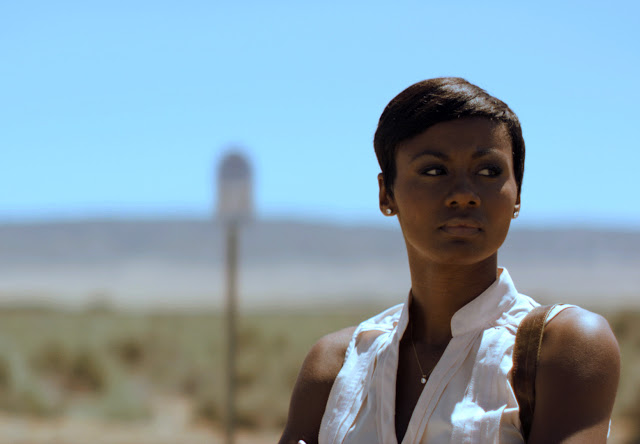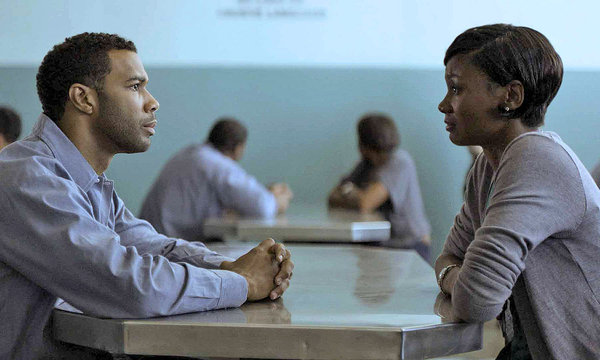Written by Megan Kearns.
I often talk about how I want to see more female-fronted films, created by female filmmakers, including women of color on-screen and behind the camera. I want complex, strong, intelligent, resilient, vulnerable, flawed women characters. I want more realistic depictions of love: tender, supportive yet complicated. I want my films to make a social statement if possible. In Ava Duvernay’s award-winning, poignant and evocative film Middle of Nowhere, she masterfully displays all of the above.
Middle of Nowhere is such a brilliant film – quiet yet intense – I worry my words won’t do it justice.
When we meet the intelligent, persistent and amiable Ruby (Emayatzy Corinealdi in a captivatingly powerful performance), she’s living for her husband Derek (Omari Hardwick). She has put her life, her career, her education, her dreams on hold. All so she can emotionally and financially support Derek. Ruby quits medical school after her husband Derek faces an 8-year prison sentence. She wants to visit her husband in prison on weekends and doesn’t want to miss his weekday calls. Ruby envisions them as a team, a united front. But Derek wants her to let go and move on with her life.
These two exchanges in the beginning of the film punctuate the disparity in Ruby and Derek’s views:
Derek: “You were on your way to doing something. Don’t stop.”
Ruby: “We were on our way.”
Derek: “I want you to keep going with your life…Don’t stop for me.”
Ruby: “You are me.”
You want Ruby to succeed. You want her to find happiness. But she can’t move on. Derek isn’t the only one trapped. Ruby is imprisoned, haunted by the beautiful memories of the past, determined to survive the present, waiting it out for her happily reunited future.
Ruby must adapt to her new life. She bonds with another wife of an inmate on her weekly bus ride to the prison, the two support one another through their ordeal. Ruby tells her mother Ruth (Lorraine Toussaint) she’s taking night shifts at the hospital so she can support Derek as he’s going through a tough time. Her mother skeptically questions this as she knows her daughter struggles and sacrifices too. Frustrated and angry, she believes Ruby is throwing her life away for a man who doesn’t matter.
Ruth: “Oh he’s going through a tough time? I see. Then, by all means, sit home and wait to comfort him. That makes a lot of sense.”
It’s also “
radical,” although it shouldn’t be, to see a loving black relationship on-screen. A beautiful yet heartbreaking love story, Ruby and Derek passionately love each other. We see Ruby and Derek cooking together, playful and tender, in Ruby’s memories. We witness her bittersweet words to Derek as she writes in an anniversary card, “Next year, I’ll whisper this in your ear. Happy anniversary. I love you.” Throughout the film, Ruby imagines Derek sleeping next to her, holding her. When Ruby visits Derek in prison, their love hangs in the air, unspoken yet palpable.
When we see a prison story, it follows the inmates, rarely their families. My mother worked at a prison, doing payroll for correctional officers. So I grew up hearing stories of inmates and COs. But what about their families? DuVernay was curious about all those women who visit their loved ones in prison. Where do they go? What are their stories? It’s a story seldom told. In
an interview, DuVernay said:
“I’m from Los Angeles and I know countless women who live this kind of life every day, year after year. You see women struggling to keep it all together while a loved one is in jail. But we don’t hear about them or their struggles in a way that resonates with others. Their stories are so compelling. It’s as if they are in their own little world and no one else sees them.”
I had the pleasure of seeing
Middle of Nowhere at the Athena Film Fest a few weeks ago. In her Q&A at the festival, Duvernay — the first African-American woman to win Best Director at Sundance — talked about the travesty of the prison system. How prisons charge an obscene amount of money for inmates to call their loved ones. How they place inmates in prisons far from their families. When asked in an interview
if she’s a feminist filmmaker, DuVernay responded:
“I’m a black filmmaker. That covers all my politics.”
While DuVernay may not call herself a feminist or identify as one, this to me was an undoubtedly feminist film. Boasting a strong, intelligent female protagonist, the film raised intersectional issues of gender, race, class, incarceration, marriage, fidelity and motherhood.
We see everything from Ruby’s perspective, witnessing her journey. DuVernay isn’t afraid to allow silence in the film, to let Ruby’s emotions sink in.
Middle of Nowhere is a “complicated love story” yet passes the Bechdel Test with ease. While Derek at times consumes her thoughts and words, Ruby converses with her sister Rosie and her mom Ruth about other topics besides men. Ruby and Rosie’s relationship nurtures yet challenges one another. The two sisters unite against their complicated relationship with their mother. Ruth tries to steer her grown children to not follow in her footsteps making the same mistakes she made. She wants her daughters to not be afraid to ask for help. She demands Ruby live her own life, wanting her to stop being afraid to speak up for herself.
With each character, you see their mistakes and flaws. You understand the circumstances that led them to make the choices they have made. Yet Middle of Nowhere villainizes no one. Derek, the easiest character to potentially demonize, retains his dignity and humanity.
We witness Ruby’s fierce passion when she confronts Derek’s lawyer and Derek’s friend Rashad. While she seems more comfortable to speak up on Derek’s behalf — although these encounters obviously impact her future too — Ruby eventually becomes more at ease articulating her needs.
Brian (David Oyelowo), the bus driver who unexpectedly enters her life, tells Ruby she expects a fairytale ending. But like reality, there is no magical fairytale ending. No one’s going to rescue Ruby. She must decide what’s right for herself.
After Ruby experiences a devastating betrayal by someone she loves, she realizes she must go after what she wants. She can’t keep living in the shadow of memories, hoping for a reality that may never materialize.
Ruby: “We are somewhere in between, in a middle place…The past has disappeared. And the future? It doesn’t exist, until we get there.”
When do you stay? When is it time to move on?
I loved Middle of Nowhere, one of my favorite films of 2012. The haunting story boasts complex, fully dimensional characters. Poetic yet realistic dialogue emanates, draped in vivid images and lush, stirring music. The bittersweet yet satisfying ending brought me to tears.
While a romance, it doesn’t fall into the stereotypical gender traps: a woman changing for a man, a woman trying to catch a man, a woman throwing her life away for a man. Putting the pieces of her shattered heart back together, Ruby emerges from a woman living for her husband to living for herself. Middle of Nowhere transcends the usual boundaries of a love story between a woman and a man to become a transformational story about loving yourself. And that’s incredibly rare and powerful.




Great review! I really want to see this. Do you know when it’s coming out on DVD? Or has it even had a theatrical run yet?
I loved the movie “Middle of Nowhere” – one of my favourite real people movies. Beautiful portrayed and the silences made the movie and Ruby’s emotions all the more poignant. There is much more I could say but it is better for people to watch it. The two central male characters were both beautiful people, emotional and loving but different. Well directed and acted.